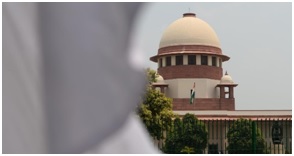

Context
Recently, US Supreme Court pronounced the verdict and overturned ROE vs. WADE case and made abortion illegal.This judgment questioned the legitimacy of Supreme Court.
- But this question of “declining legitimacy of a Supreme Court” is a concern of all democrats, even in India. So we can also use the litmus test of Legitimacy on Indian Supreme Court.
Background
- For decades, the Supreme Court has attracted disproportionate public attention and international admiration for its judicial interventions with its well-known innovations like-
- public interest litigation
- basic structure doctrine
- the concomitant judicialisation of politics in India
- From last few instances, however, there has been a general sense of disappointment with the Supreme Court, with a widely shared lament that the court has failed to be a protector of democratic institutions.
The brief aims to trace the departures in the Court’s behaviour, as well as discuss the continuities in its approaches to constitutional interpretation.
The concept of ‘Judicial Legitimacy’
- The power to declare invalid an expression of the will of a democratically elected legislature involves a responsibility of a special kind. Fidelity and not bravery or creativity is the quality that sustains judicial legitimacy.
- Courts need to display legitimacy and fairness constantly and must continue to respect the terms of the trust upon which they exercise their authority.
- Legitimacy is a precious property. It must be carefully nurtured.
- The acceptance of judicial decisions requires their legitimacy. Judicial power rests on trust.

Aspects of legitimacy:
- Court’s role in enforcing the core principle of “limited government”.
- Court’s recognition, and endorsement of the fundamental distinction between “rule of law” and “rule by law” — prepositions matter.
- Court’s role as the promoter of “constitutional morality”.
- Judicial activism
What makes a court illegitimate?
- Accusations that the Supreme Court has gone “rogue” are often another way of saying that it has tacked too far to the right of public opinion.
- The Supreme Court — or any court, for that matter — would be less legitimate if it factored public opinion into its decision-making.
Why a judicial verdict carries legitimacy?
- A legal order or judicial verdict carries legitimacy. It can be more easily be defended, at least in the public narrative.
- An action – even if the objective is destructive – has to be validated by the law.
- In other words, it has to be accepted in the eyes of its recipients, otherwise it will lose its claim of legitimacy.
|
Jacques Derrida (1992) says the law must not be just a law but it should be a ‘just’ law. |
Why is legitimacy important?
- A larger impact: The judiciary not only decide matters of fundamental importance to individual citizens and to society at large but also affect with their judgments and rulings even the ordinary affairs of every individual who seeks the aid of the courts.
- On behalf of society: In order to do this, judges are given an authority and powers which are very far reaching. Such authority and powers are exercised on behalf of society as a whole.
- Accountability: The judiciary provides a public service. It is axiomatic that it should account to the society it serves.
Erosion of credibility in case of India:
- Government interference: In 2018, four senior sitting judges of the Supreme Court held a press conference and aired their grievances against the administration of the court by the then Chief Justice, hinting at government interference.
- Unexplained transfers: Transfersof judges without adequate reason is a common affair.
- Sealed cover: The increasing incidence of sealed-cover jurisprudence, where the government engages privately with the court, in a public hearing, without sharing information with the opposite party, has occasioned considerable protest.
- Erosion of constitutional morality: India also saw Erosion of constitutional morality most clearly in the case of Fr Stan Swamy who was denied a straw, denied decent healthcare, and denied bail all in the name of “rule of law”.
- High rate of case pendency: As of May 2022, over 4.7 crore cases are pending in courts across different levels of the judiciary. Of them, 87.4% are pending in subordinate courts, 12.4% in High Courts, while nearly 1, 82,000 cases have been pending for over 30 years.
- Under trials on the rise: As per the Prison Statistics-2020, released by the National Crime Records Bureau (NCRB), under trials accounted for 76% of the total inmates in around 1,300 prisons across the country.
The executive need to ensure that the strength of the judiciary is adequate to discharge its constitutional duty of rendering effective justice to all within a reasonable time.
Way Forward
Supreme courts need to be vigilant about these threats to their “legitimacy”. They need to stand not just some distance away from the dynamics of political power, to avoid being pulled under by its eddies, but also some distance above these dynamics so that they can reflect on their privileged position and their sacred responsibility. They should follow the constitution and adjudicate on the matters which questions the constitutionality of the law.



